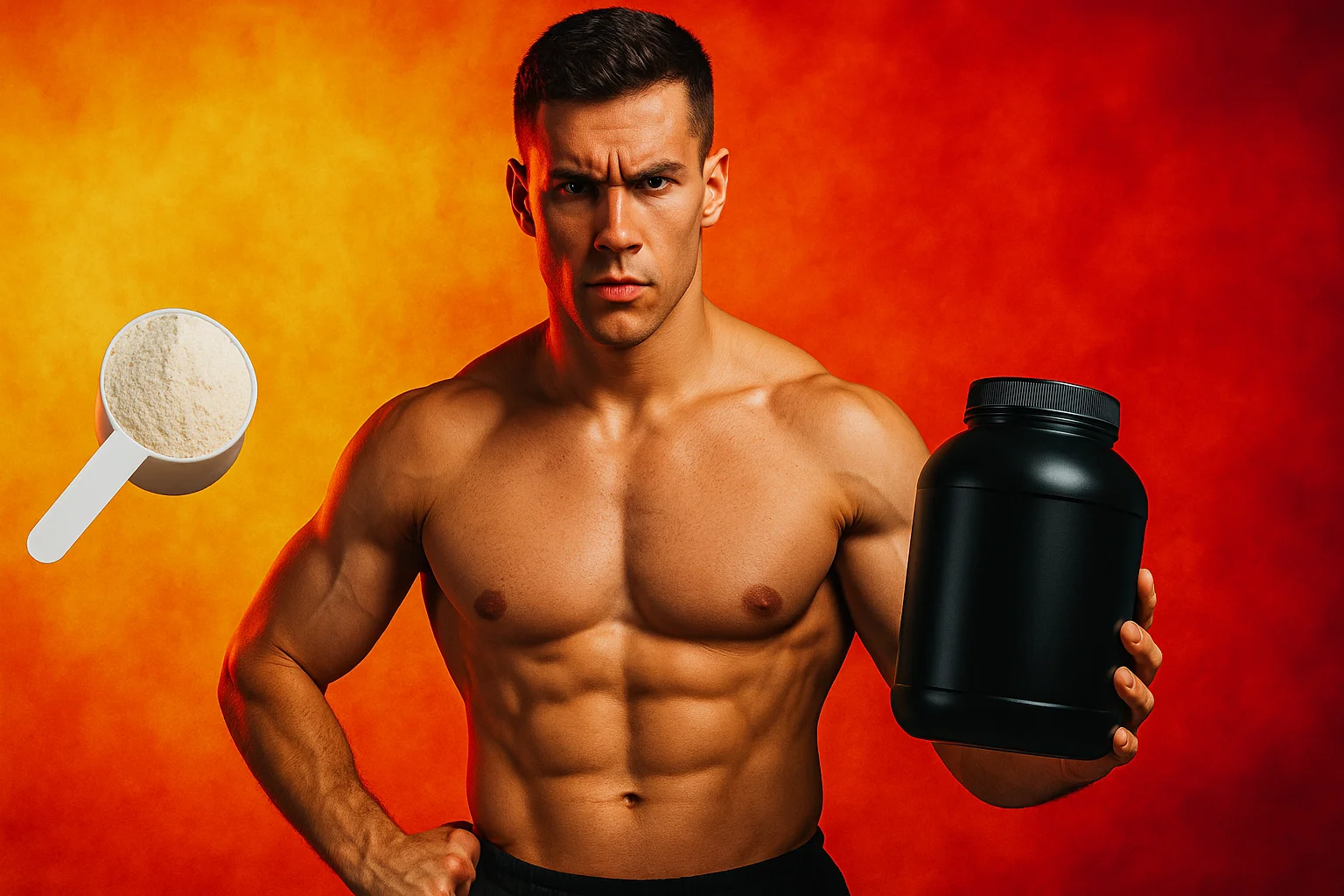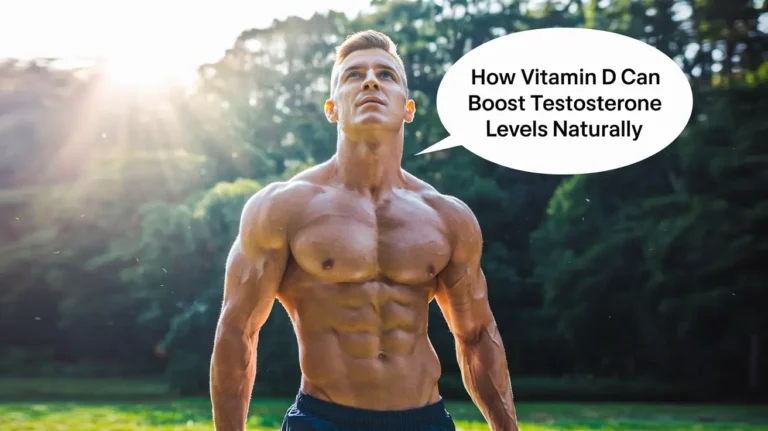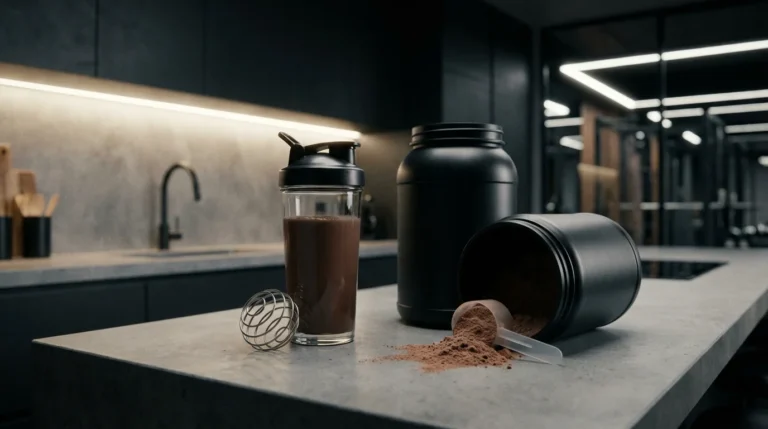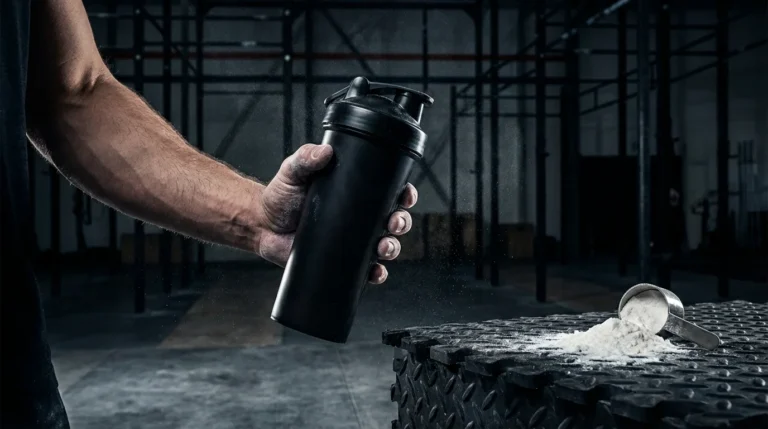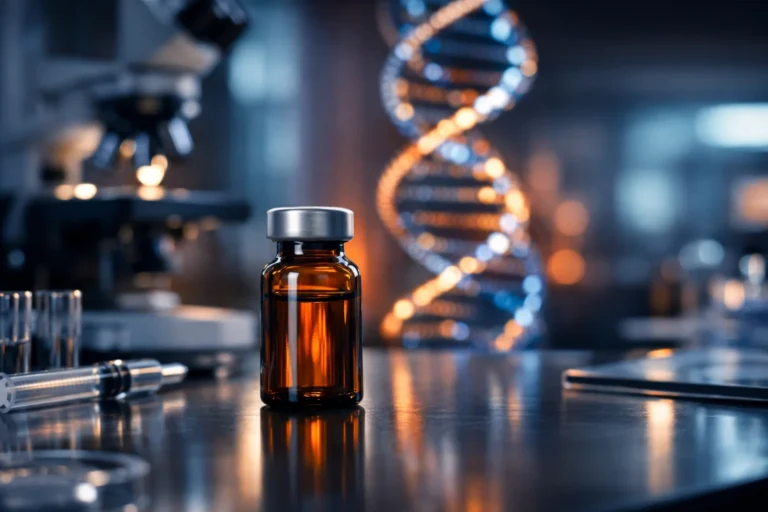Vitamin D is often called the sunshine vitamin because our bodies produce it when exposed to sunlight.
It plays a crucial role in many bodily functions, including hormone production. Studies suggest that vitamin D can help boost testosterone levels naturally, which is important for men’s health.
In this article, we will explore how vitamin D influences testosterone, ways to increase its intake, and lifestyle changes that can further enhance testosterone levels.
Key Takeaways about Vitamin D to Boost Testosterone
- Vitamin D helps the body produce testosterone, making it vital for men’s health.
- Getting enough sunlight is one of the easiest ways to increase vitamin D levels.
- Foods like fatty fish, egg yolks, and fortified products are good sources of vitamin D.
- Regular exercise and good sleep can naturally boost testosterone levels.
- It’s important to check your vitamin D and testosterone levels to maintain a healthy balance.
Vitamin D and Testosterone: Key Insights
Understanding the Role of Vitamin D in Hormone Production
When we talk about hormones, we often think of testosterone, especially when it comes to men’s health.
Vitamin D plays a crucial role in hormone production, and understanding this connection can help us boost our testosterone levels naturally.
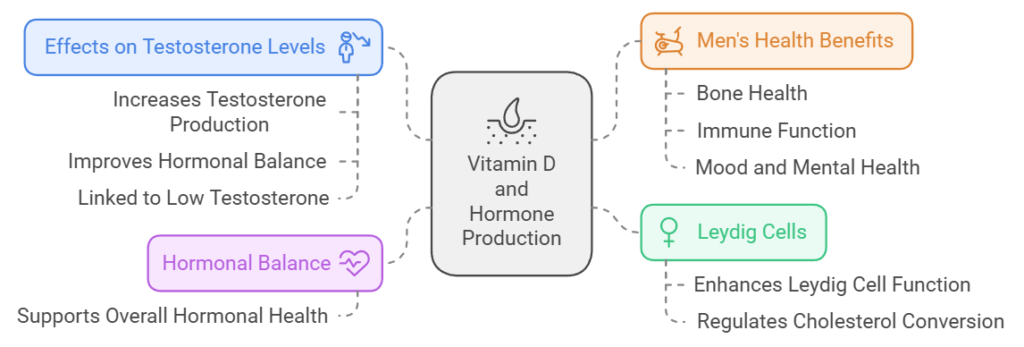
How Vitamin D Affects Testosterone Levels
Vitamin D is not just a vitamin; it acts like a hormone in our body. Studies show that higher levels of vitamin D can lead to increased testosterone levels.
Here’s what we need to know:
- Vitamin D helps in the production of testosterone in the testes.
- It can improve the overall hormonal balance in our bodies.
- Low vitamin D levels are often linked to lower testosterone levels.
The Science Behind Vitamin D and Hormones
So, how does this all work? When we get enough vitamin D, it can:
- Enhance the function of the Leydig cells, which produce testosterone.
- Regulate the enzymes that convert cholesterol into testosterone.
- Support overall hormonal health, which is vital for men.
Why Vitamin D is Essential for Men’s Health
Vitamin D is essential for more than just testosterone. It also:
- Supports bone health.
- Boosts immune function.
- Improves mood and mental health.
In short, maintaining adequate vitamin D levels is key for our overall health and well-being.
By understanding the role of vitamin D in hormone production, we can take steps to ensure we’re getting enough of it, whether through sunlight, diet, or supplements. Let’s keep our testosterone levels in check and feel our best!
Natural Ways to Increase Vitamin D Intake

When it comes to boosting our vitamin D levels, we’ve got some fun and easy options!
Getting enough vitamin D is super important for our overall health, especially for keeping our testosterone levels in check.
Here’s how we can naturally increase our vitamin D intake:
Sun Exposure and Vitamin D
- Soak up the sun! Spending about 15-30 minutes outside a few times a week can help our bodies produce vitamin D. Just remember to wear sunscreen if we’re out for longer!
- The best time to catch those rays is between 10 AM and 3 PM when the sun is at its peak.
- If we live in a place with long winters, we might need to get creative with our vitamin D sources.
Dietary Sources Rich in Vitamin D
We can also get vitamin D from our food. Here are some tasty options:
- Fatty fish like salmon and mackerel
- Egg yolks
- Fortified foods like milk and orange juice
| Food Item | Vitamin D Content (IU) |
|---|---|
| Salmon (3.5 oz) | 570 |
| Mackerel (3.5 oz) | 360 |
| Fortified Milk (1 cup) | 120 |
Supplements: When and How to Use Them
Sometimes, we might need a little extra help:
- Choose a good quality vitamin D supplement if we can’t get enough from the sun or food.
- Follow the recommended dosage on the label or consult with a healthcare professional.
- Take it with a meal that has fat to help with absorption.
Remember, balancing our vitamin D levels is key to keeping our testosterone levels healthy. Let’s make sure we’re getting enough of this vital nutrient!
The Connection Between Vitamin D and Testosterone
Research Studies on Vitamin D and Testosterone
We’ve seen a bunch of studies that show how vitamin D can really help boost testosterone levels.
For instance, one study found that men with higher levels of vitamin D had significantly higher testosterone levels. This connection is pretty clear!
How Vitamin D Supports Testosterone Production
So, how does vitamin D actually help? Here’s the scoop:
- It helps in the production of testosterone in the testes.
- It can improve the function of the cells that produce testosterone.
- It also plays a role in regulating other hormones that can affect testosterone levels.
The Impact of Vitamin D Deficiency on Testosterone
Now, let’s talk about what happens when we don’t get enough vitamin D.
A deficiency can lead to lower testosterone levels, which can affect our mood, energy, and even muscle mass. Here’s a quick look at the effects:
| Effect of Vitamin D Deficiency | Possible Outcomes |
|---|---|
| Low testosterone levels | Fatigue |
| Mood swings | Depression |
| Decreased muscle mass | Weakness |
It’s super important to keep our vitamin D levels in check to maintain healthy testosterone levels. Let’s not forget that a balanced diet and some sunshine can go a long way!
Lifestyle Changes to Boost Testosterone Naturally
Exercise and Its Effect on Testosterone
Let’s face it, getting off the couch and moving around is one of the best things we can do for our testosterone levels.
Regular exercise can help us feel more energetic and boost our hormone levels.
Whether it’s hitting the gym, going for a run, or even just taking a brisk walk, staying active is key.
Here are some types of exercise that can really help:
- Strength training: Lifting weights can significantly increase testosterone levels.
- High-intensity interval training (HIIT): Short bursts of intense activity followed by rest can be super effective.
- Cardio: While it’s great for overall health, too much can actually lower testosterone, so balance is important.
The Role of Sleep in Hormone Regulation
We all know that sleep is important, but did you know it’s also crucial for keeping our testosterone levels in check?
Getting enough quality sleep helps our bodies produce hormones effectively. Here are some tips for better sleep:
- Stick to a sleep schedule.
- Create a relaxing bedtime routine.
- Keep your bedroom dark and cool.
Stress Management for Hormonal Balance
Stress can be a real killer when it comes to testosterone. When we’re stressed, our bodies produce more cortisol, which can lower testosterone levels.
Managing stress is essential for keeping our hormones balanced.
Here are some ways to reduce stress:
- Practice mindfulness or meditation.
- Engage in hobbies that make us happy.
- Spend time with friends and family.
Remember, small changes in our daily habits can lead to big improvements in our testosterone levels!
Common Myths About Vitamin D and Testosterone
Debunking Vitamin D Myths
Let’s clear the air about some common myths surrounding vitamin D and testosterone.
One big misconception is that vitamin D doesn’t really affect testosterone levels.
But studies show that vitamin D can actually play a role in boosting testosterone! It’s not just a rumor; there’s science behind it.
Understanding the Limits of Vitamin D
Another myth is that taking vitamin D supplements will automatically raise your testosterone levels.
While vitamin D is important, it’s not a magic pill. It’s essential to combine it with a healthy lifestyle. Here are some key points to remember:
- Vitamin D helps in hormone production, but it’s not the only factor.
- A balanced diet and regular exercise are crucial for overall health.
- Relying solely on supplements without lifestyle changes won’t yield great results.
Separating Fact from Fiction
Lastly, there’s a belief that a plant-based diet lowers testosterone levels.
This idea is misleading. Many plant-based foods are rich in nutrients that can support hormone health. So, don’t shy away from those greens!
Remember, it’s all about balance. A healthy lifestyle, including proper nutrition and exercise, is key to maintaining good testosterone levels.
In summary, while vitamin D is important, it’s just one piece of the puzzle. Let’s not fall for the myths and instead focus on a holistic approach to health!
Monitoring Your Vitamin D and Testosterone Levels

How to Test Your Vitamin D Levels
To keep our health in check, we need to know our vitamin D levels. Here’s how we can do it:
- Blood Test: The most common way is through a blood test that measures the level of 25-hydroxyvitamin D.
- Home Testing Kits: There are also home testing kits available that can give us a quick idea of our levels.
- Regular Check-ups: It’s a good idea to get tested regularly, especially if we have risk factors for deficiency.
Understanding Testosterone Tests
When it comes to testosterone, we should know:
- Total Testosterone: This measures the overall testosterone in our blood.
- Free Testosterone: This shows the testosterone that’s available for our body to use.
- Timing Matters: Testosterone levels can vary throughout the day, so testing in the morning is usually best.
When to Consult a Healthcare Professional
If we notice any signs of low testosterone or vitamin D deficiency, it’s time to reach out to a healthcare professional. Here are some signs to watch for:
- Fatigue or low energy
- Decreased libido
- Mood changes
Remember, monitoring our vitamin D and testosterone levels is key to maintaining our overall health.
Wrapping It Up: Vitamin D and Testosterone
Vitamin D isn’t just for keeping your bones strong; it can also help boost your testosterone levels naturally.
By soaking up some sun or adding a supplement to your routine, you might just feel more energetic and stronger.
Remember, though, it’s always a good idea to chat with a doctor before making any big changes to your health plan.
Keep it simple, stay active, and enjoy the benefits of that sunshine vitamin!
Unlocking Your Potential: The Ultimate Guide to Testosterone Boosters
Frequently Asked Questions About Vitamin D and Testosterone
How does Vitamin D affect testosterone levels?
Vitamin D acts like a hormone and plays a crucial role in the body's hormone production, including testosterone. Studies indicate that higher levels of vitamin D are linked to increased testosterone, while low vitamin D levels are often associated with lower testosterone.
What is the science behind Vitamin D boosting testosterone?
Vitamin D supports the production of testosterone in the testes by enhancing the function of Leydig cells. It also helps regulate enzymes necessary for converting cholesterol into testosterone and contributes to overall hormonal balance vital for men's health.
What are natural ways to increase Vitamin D intake?
Natural ways to increase vitamin D include sun exposure (15-30 minutes a few times a week, ideally between 10 AM and 3 PM) and consuming foods rich in vitamin D, such as fatty fish (salmon, mackerel), egg yolks, and fortified products like milk and orange juice.
Can I use Vitamin D supplements to boost testosterone?
Yes, if you cannot get enough vitamin D from sunlight and diet, a quality vitamin D supplement can be helpful. Follow the recommended dosage and take it with a meal containing fat for better absorption. However, supplements are most effective as part of a healthy lifestyle.
Does Vitamin D deficiency impact testosterone?
Yes, a deficiency in vitamin D can lead to lower testosterone levels. This can potentially result in symptoms such as fatigue or low energy, mood swings, and decreased muscle mass. Maintaining adequate vitamin D levels is important for healthy testosterone.
Besides Vitamin D, what other lifestyle changes boost testosterone?
Key lifestyle changes that can naturally boost testosterone include regular exercise (especially strength training and high-intensity interval training), ensuring sufficient quality sleep, and managing stress effectively, as high stress levels (cortisol) can lower testosterone.
How can I check my Vitamin D and testosterone levels?
Vitamin D levels are typically checked with a blood test measuring 25-hydroxyvitamin D. Testosterone levels can also be measured via blood tests (Total and Free Testosterone), often recommended in the morning when levels are highest. Consult a healthcare professional if you have concerns or symptoms of low levels.
